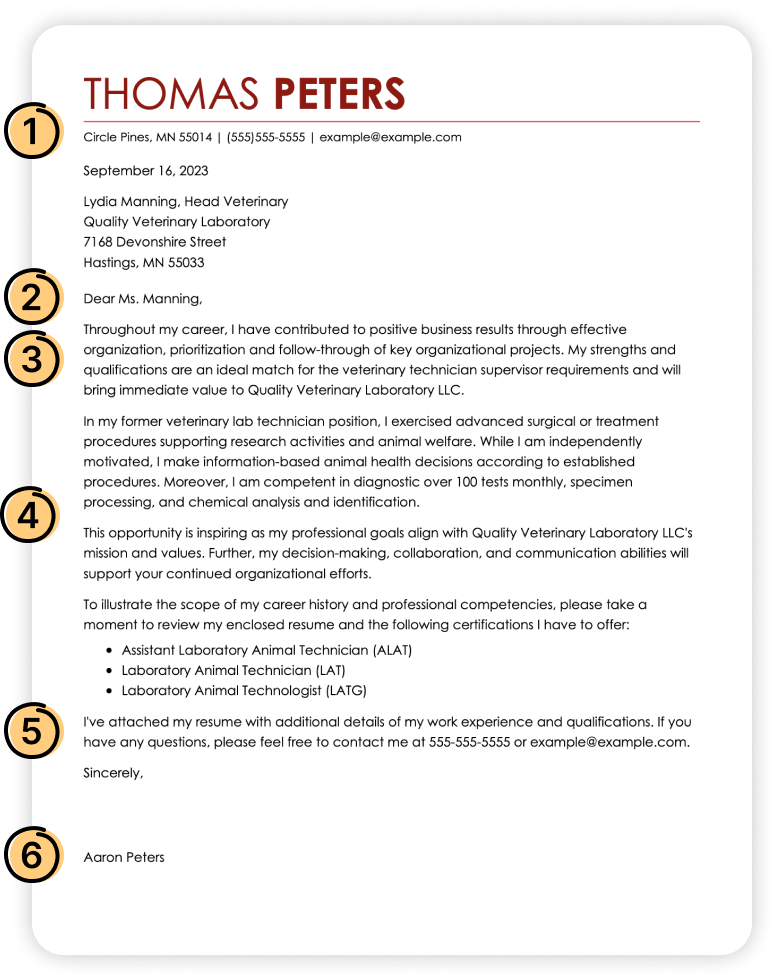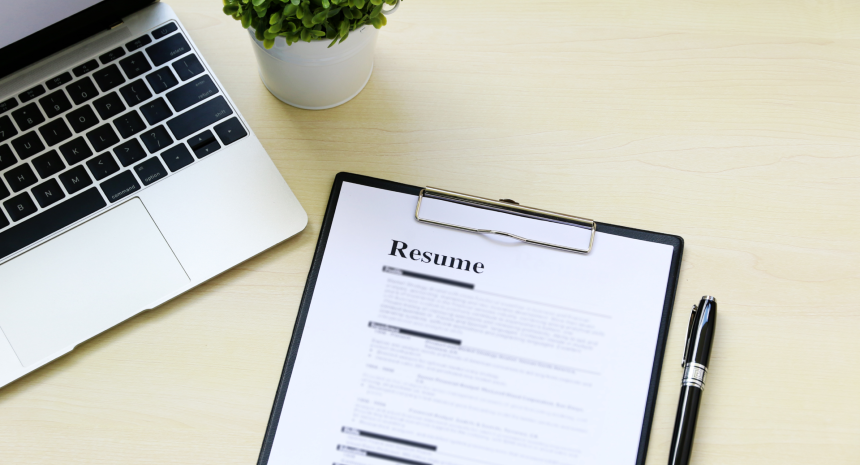A great cover letter can make all the difference in getting the job you want. It gives you an opportunity, alongside your resume, to promote your qualifications and communicate your interest in the role directly to employers.
Browse our cover letter examples for almost any industry to get inspired. Use our examples as templates to build your own job-winning cover letter and open the door for your next opportunity.
- What a cover letter is and how it's structured
- Cover letter examples for a variety of different job seeker scenarios
- Cover letter examples for hundreds of industries and job titles
- Writing tips for creating a compelling cover letter for your resume
Or let us help you write your cover letter. Try out our AI Cover Letter Generator to save yourself valuable time and energy. With high-quality templates and automated suggestions based on your professional goals, you can have a cover letter ready to go in minutes!
6 Great Cover Letter Examples
Cover Letter Examples by Industry and Job Title
If you enjoy crunching numbers and reading spreadsheets, you can count on our cover letter examples for accounting jobs to help you prepare for your job application.
Administration cover letter samples (23)
Browse these good cover letter examples to find inspiration for writing a standout letter that will help you land an administrative job.
Architecture cover letter examples (1)
Whether you're an entry-level drafter or an experienced architect, use our cover letter examples to impress your next employer and set you up for career success.
Banking cover letter examples (4)
With cover letter examples for internships and senior-level positions, our samples will help you write a letter that can get you hired in the banking industry.
Childcare cover letter samples (5)
From babysitting to running a daycare, you will find the inspiration you need in our childcare cover letter examples to get the attention of potential employers.
Customer service cover letter examples (14)
Whether you are a seasoned professional or looking for your first job, you can rely on our cover letter examples to help you break into customer service.
Education cover letter samples (12)
Our samples include some of the best cover letter examples for teachers, from elementary school to graduate level, to help you feel confident conveying your passion and pursuing exciting opportunities in education.
Our professional cover letter examples for engineers are perfectly designed to help you write a job-winning document for your next engineering role.
Whether you're an actor or a DJ, a good cover letter will help you take your act to the main stage. Study our entertainment cover letter examples and learn how to get noticed.
A good cover letter example tells a story. Study these film cover letter samples to learn how to put the spotlight on your skills and experience.
The key to landing an excellent food service job is to serve up your skills and experience on a silver platter. Check out these cover letter examples to learn how.
A strong cover letter gives you a competitive advantage over similarly qualified candidates. Gather some writing ideas from our professional cover letter examples for healthcare roles.
A good cover letter is critical to landing a role in this competitive field. Review our hospitality cover letter examples for a better shot at getting a recruiter's attention.
Use our HR cover letter samples to show you what a professional cover letter should look like for a job in human resources.
Everyone, from directors to recent graduates, will find value in these professional IT cover letter examples. Read them to learn how to write your own.
Law cover letter samples (6)
A strong cover letter is critical to landing a job in the field of law. Review our examples for a job as an attorney, legal assistant, or lawyer for help writing a legal cover letter that captures employers' attention.
To land your next big role, you must write a clean maintenance cover letter. Our cover letter examples will show you how to write a document that stands out from the pack.
Our cover letter examples for marketing professionals show you how to articulate your interpersonal skills, media placement strategies, and project management know-how.
Perform a checkup on your job search with a strong professional cover letter. Let our medical cover letter examples show you how.
Our nursing cover letter examples show you how to give your cover letter a proper checkup. Study them to learn how to write a letter that will get you noticed by hiring managers.
Real estate cover letter samples (6)
You know how to sell houses—now it's time to sell your qualifications. Get ideas for writing your application letter from our library of real estate cover letter examples.
Retail cover letter examples (5)
A stellar application letter can give you an edge over the competition. Our cover letter examples for retail jobs will get you started.
Safety and security cover letter examples (5)
Browse our strong cover letter examples for safety positions to help secure your next job. See how to get noticed for your research skills, competency with equipment, and ability to work in a team.
Sales cover letter samples (11)
Whether you sell advertising or products, you must sell yourself in your cover letter. Check out our job application letter samples for sales positions.
What Users Say About Our Cover Letter Examples
What Is a Cover Letter?
A cover letter is a concise one-page document submitted alongside your resume in the job application process. Writing one is useful for offering further insights into your relevant skills and experiences for the specific job you're applying for.
Typically composed of three to four short paragraphs, a cover letter has several purposes.
First, it provides additional information to help a recruiter assess how well you align with the requirements of the position.
Second, it gives you the space to explain any unusual circumstances that might otherwise be red flags on your resume, such as gaps in your work history.
While not every job application requires a cover letter, it never hurts to include one. In fact, writing a custom cover letter for a job shows that you are willing to go the extra mile, demonstrates your commitment to the role, and gives you a chance to showcase your stellar communication skills.
The 6 parts of a cover letter
A cover letter for a resume should contain six sections: the header, a greeting, an opening paragraph, body paragraphs, a closing statement, and a professional signoff. Here is what belongs in each section:

- Header
List your contact information. Follow it with the date you submit your letter, the name and title of who will receive it, and the company's address.
- Greeting
Greet the recruiter or hiring manager who will read your letter. Do your best to address the person by name to increase its impact.
- Opening paragraph
Introduce yourself and express your enthusiasm for the role. If you have a referral, mention it here.
- Body paragraphs
Provide specifics about your work experience and relevant skills, including measurable achievements that show you're the right person for the role.
- Closing paragraph
Express your interest in learning more about the role and invite the hiring manager to contact you.
- Professional signoff
Finish with a polite and professional signoff, such as "Sincerely." Avoid overly familiar signoffs, like "Love" or "Cheers."
5 Writing Tips for Building a Great Cover Letter
Greet the hiring manager by name
This is one of the most important tips for any good cover letter.
Hiring managers sometimes read dozens of cover letters a day, which means generic salutations like "To Whom It May Concern" get old fast. To stand out, take the time to track down the name of the recruiter or hiring manager who will be reading your letter and resume.
Sometimes, it will be listed on the job ad, but often, you'll need to do a little digging. Start with the company's website. If you can't find it there, do a quick search on LinkedIn. Adding this personal touch to your cover letter can make a hiring manager take notice because it shows you're resourceful.
If you do have to address a cover letter without a name, "Dear Hiring Manager" is an appropriate choice.
Use bullet points for readability
Employers rarely have the time to pore over cover letters, so you should make your document easily scannable with a bullet-point list of key accomplishments.
The most logical place to do this would be the body of your cover letter, where you make your sales pitch.
Explain how you would contribute to the organization's goals
Avoid making the common cover letter mistake of simply restating your resume. You're trying to make the case that you're the best candidate for the job. What is the best way to do that? Tell them.
A strong cover letter for a resume begins with your most relevant achievements near the start of the letter to make the hiring manager feel they must interview you.
Be concise when describing your experience
With hiring managers so short on time, a cover letter with too much detail doesn't grab attention or efficiently communicate your strongest qualifications. Tighten every sentence to keep only the most relevant facts about your skills and experience.
Use a professional template
Give your application a professional sheen with a cover letter template that matches your resume template. Using a template allows you to bypass formatting your cover letter, and having a cohesive design between these two documents will make your application materials shine.
Cover Letter Examples FAQ
Last Updated: January 09, 2026
Our cover letter examples provide a great template for you to base your own letter around. We have samples for all types of careers, so you're likely to find a letter that is similar to your own needs.
Use this letter to provide a framework for how you should write about your qualifications and interest in the position. You can even use the template designs as inspiration for how you want to present yourself!
A strong cover letter outlines the work experience and hard and soft skills that make you unique. Concentrate on highlighting the ones that relate directly to the role you seek. Be succinct; many recruiters read dozens of cover letters for every open role. Keeping the contents of your letter on point and relevant will improve your chances of landing a job interview.
Additionally, your cover letter should not simply repeat what's in your resume. When you write your resume, you'll have a strong summary of your career and wins. Your cover letter should expand on those points, not repeat them.
Speaking of your resume, use resume examples to make sure your document is properly formatted. A poorly constructed resume will get your application tossed in the trash before anyone sees your cover letter.
The same goes for a curriculum vitae (CV). To be safe, make your CV with a builder where you can choose from professional templates and review dozens of examples to ensure your CV is high-quality and a good complement to your cover letter.
There’s no single phrase to use in a cover letter that guarantees your cover letter will resonate with employers. That said, there are lots of ways to fill your cover letter with effective phrases.
Using active verbs like “led,” “spearheaded,” or “organized” will help employers see your motivation and impact. Additionally, filling your cover letter with keywords from the job description will help it feel targeted to the role and improve its chances of passing ATS.
Aside from profanity, there are no specific words that should not be used in a cover letter. However, there are some topics that do not belong in a cover letter.
Never reveal overly personal information, such as your religious preferences, age, nationality, marital status, or political leanings, unless it is explicitly stated in the job ad. Adding these to the letter can introduce bias into the hiring process.
Also, avoid saying anything negative about a former employer when writing about a layoff or other past work situation.
The three main parts of a cover letter are the introduction, body, and conclusion. Here's what each part should include:
- Introduction: A proper introduction will begin with a greeting for a specific person (like the hiring manager), followed by a statement about who you are and the position you're interested in.
- Body: This is the core of your cover letter. In two or three paragraphs, explain why you'd be a great candidate for the role. Be sure to highlight your relevant skills and any quantifiable metrics that prove you were successful in previous roles.
- Conclusion: End a cover letter with a short paragraph thanking the hiring manager and welcoming an opportunity to interview. Then, after a space, insert a salutation, such as "Regards" or "Sincerely," followed by your name.
A simple cover letter shouldn't be long and complicated. The best cover letters are succinct and to the point.
Use your cover letter to introduce yourself to the hiring manager and outline the skills and qualifications that make you the right fit for the position. Study our example cover letters for the job title you seek to learn how to craft a letter that will get you noticed.
There's no perfect template for every cover letter, but the best choice is usually a simple, polished template that matches your resume’s design. Preview an array of cover letter templates before making your decision, and tailor your template choice to the specific role you're applying for.
Yes and no. AI is a powerful tool that can help you generate ideas, organize your thoughts, and perfect your ideas. But a truly great cover letter will always require a human touch. Whether you use ChatGPT or an AI cover letter generator, make sure to flesh out your letter with specific details from your resume and customize the content to match the role.
Cover Letter Resources
Check out our library of free articles to learn how to make your cover letter even better.


![What Should a Resume Look Like in 2025? [+ Example] What Should a Resume Look Like in 2025? [+ Example]](/sapp/uploads/2024/08/what-should-a-resume-look-like-hero.png)




